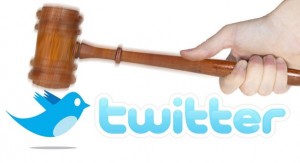Tweet From the Juror Box, Go to Jail
I’ve blogged plenty of times before about jurors, and other participants in the legal system, getting themselves into trouble by using social networking sites at inappropriate times, in inappropriate ways. Usually, these cases involve jurors or judges expressing bias in a case, or lawyers absentmindedly publishing confidential information on the Internet.
There tends to be a common theme in discussions of this issue: the legal system has trouble keeping up with technology. But, it looks like California is going to become one of the first states to make a serious effort to close this gap, by clarifying the rules governing technology and courtroom decorum, and that there are still places in the modern world where tweeting, texting, and posting on Facebook are simply not acceptable. And, more importantly, reminding people that some information still shouldn’t be made public, no matter how easy it is to do so.
And this proposed law is not messing around: it requires jail time, and requires judges to explicitly explain to jurors that communicating to the outside world about the case, or doing any independent research on the case, is prohibited, and imposes jail time for jurors who violate these rules.
I think it’s very unfortunate that a rule like this is necessary, but it’s necessary, nonetheless.
The legal system in the United States still relies very heavily on juries to make decisions, more than perhaps any other country. Even in the UK, where our jury system originated, the use of juries has been reduced significantly over the centuries. So, because juries are such an integral part of the American legal system, maintaining the integrity of juries, and individual jurors, is absolutely essential.
 Many people are incredibly cavalier about their use of social networking services like Twitter and Facebook. Some people share every aspect of their lives online. If that’s how you want to live, nobody should stop you. However, when you are serving on a jury, somebody’s life may, quite literally, be in your hands. While you have the right to share every aspect of your life on line, if you want to, you don’t have the right to toy with the life of another person.
Many people are incredibly cavalier about their use of social networking services like Twitter and Facebook. Some people share every aspect of their lives online. If that’s how you want to live, nobody should stop you. However, when you are serving on a jury, somebody’s life may, quite literally, be in your hands. While you have the right to share every aspect of your life on line, if you want to, you don’t have the right to toy with the life of another person.
Even if posting information about a case doesn’t directly prejudice a juror’s decision, it can harm the image of the jury system in the eyes of the public. And this isn’t just vanity – the jury system’s effectiveness is largely dependent on the public’s acceptance of its legitimacy.
And when jurors are tweeting from the jury box, or talking about deliberations on Facebook, anyone who reads these postings would seriously question that juror’s impartiality. In one case, a juror even tweeted, before the trial was over, that she was looking forward to convicting the defendant.
Thankfully, these occurrences are relatively rare. The purpose of this new law seems to be to ensure that it stays that way.
Jail time may seem harsh, but as long as the sentences are not excessive (certainly they should be no more than a year, and probably significantly less than that), I think that this is just the deterrent that jurors need to take their responsibilities seriously. And because the law requires judges to clearly explain these new rules to jurors, as well as the consequences for breaking them, nobody who is convicted of violating the law will be able to claim ignorance (not that that’s an excuse, anyway).
While it’s usually pretty easy to determine if a juror has posted information about a trial online (where everyone can see it, and it’s usually attached to their name), what’s more difficult is stopping jurors from consulting outside sources during a trial, especially if it’s a high-profile trial.
When deciding on a verdict, jurors are only supposed to consider the evidence that’s presented to them by the lawyers for each side of the case, the testimony of witnesses that have been called, and the judge’s jury instructions. However, if a trial is being covered by the media, you can be sure that the airwaves (and the Internet) will be rife with news reporting about the trial and the events leading up to it, and, perhaps more dangerously (to a juror’s impartiality), constant speculation and debate. Since anyone with a cell phone that was made in the last 5 years or so can access the Internet at virtually any time, they have access to all of this outside information and speculation, which is virtually guaranteed to shape their views of the parties and witnesses, especially when the media delves into subjects irrelevant to the case at hand, like their personal lives.
I’m really not sure how we can prevent jurors from accessing outside information. The fact is, in this modern, interconnected world, if a juror wants to access outside commentary about the trial they’re sitting on, they can, and if they’re discreet, it’s unlikely that anybody will find out.
Hopefully, these rules, when explained to jurors, will deter such conduct, not because of the risk of getting caught, but because they will impress upon jurors the importance of the task at hand.

Comments